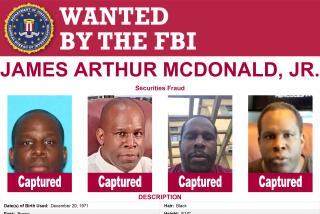Consultant, 23, Faces Charge of Mail Fraud : Unregistered Adviser Could Get 5-Year Term
- Share via
NEW YORK — A young, unregistered financial consultant accused of diverting as much as $10 million of investors’ money to his lush life style of fine art, luxury homes and fancy cars, was charged Thursday with mail fraud.
Federal prosecutors in Manhattan filed a one-count criminal complaint against David Peter Bloom, who parlayed a college investment club into a $10-million investment business within two years of graduation.
The mail fraud charge carries a maximum penalty, upon conviction, of five years in prison and a $250,000 fine.
Bloom, 23, of Manhattan, was released on bond after an appearance before U.S. Magistrate James Francis IV.
Bloom’s lawyer, Peter H. Morrison, said the mail fraud charge encompassed all of the allegations in a Securities and Exchange Commission civil action brought against the self-styled money manager on Monday.
The SEC accused Bloom, who never registered with the agency as required, of diverting for his own use up to $10 million in funds that unsuspecting clients thought he was investing in securities.
Favored American Masters
Bloom settled the SEC action late Monday without admitting guilt and agreed to hand over all his assets to a court-appointed receiver. He also has been barred for life from the securities industry.
Bloom’s spending spree included $4.7 million for paintings, a $1.9-million beach house, an $830,000 condominium, $230,000 worth of automobiles and a $195,000 necklace, the Securities and Exchange Commission said in a civil action disclosed Tuesday.
“It is anticipated that these assets can be liquidated in an orderly manner and at a profit,” Morrison said Wednesday.
The government did not account for $2 million of the $10 million that about 100 investors had sunk into Bloom’s unregistered investment firm, Greater Sutton Investors Group.
Among about 40 paintings were the works of such American masters as Edward Hopper, John Singer Sargent, Mary Cassatt and Willem DeKooning. Many adorned Bloom’s living room walls.
“It’s conceivable that it was better to invest in American art than to invest in the stock market,” Morrison said at a news conference, refusing to answer most questions and leaving after three minutes.
Morrison wouldn’t identify Bloom’s clients and wouldn’t comment on whether Bloom faced criminal prosecution.
In Durham, N.C., Duke University, Bloom’s alma mater, announced that it would return paintings and money he donated recently.
The university also will cancel a $1-million pledge that Bloom made to create an endowment for the school’s art museum, Duke President H. Keith Brodie said Wednesday.
Remained Silent
Bloom donated two paintings, appraised at $58,500, to the school’s Museum of Art in August, Brodie said, and had made two payments of $10,000 each toward prior pledges.
Bloom, dressed in a gray suit, blue shirt and brown tie, looked nervous and uncomfortable but did not speak during the brief proceeding Thursday.
The SEC claimed that Bloom started an investment club in 1983 while a student at Duke and within a year was taking money from students and non-students, including family friends. But he already was using some of the funds “in order to meet his personal expenses,” according to the complaint.
After graduating in 1985, Bloom returned to his native New York, opened an office under the name of Greater Sutton Investors Group and leased stock quote machines and other equipment.
More to Read
Inside the business of entertainment
The Wide Shot brings you news, analysis and insights on everything from streaming wars to production — and what it all means for the future.
You may occasionally receive promotional content from the Los Angeles Times.










